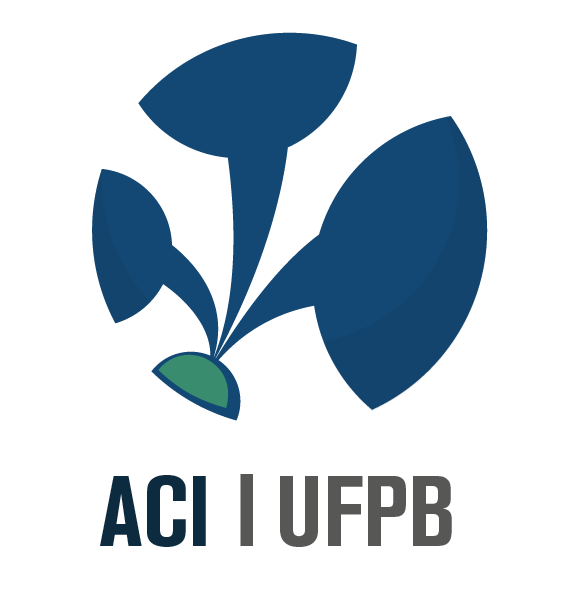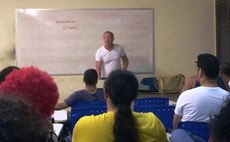Notícias
Musicians must work entrepreneurial mindset, argues Swedish teacher at UFPB
Federal University of Paraíba (UFPB), through the Department of Music, has started a partnership with Örebro University (Sweden) with funds of the Linnaeus-Palme Program.
The subsidy covers the travel costs and the stay of students and teachers during the exchange program. Three students from each institution will be exchanged per year, for a period of one to two semesters; and two teachers can be exchanged annually, for a period of three to ten weeks.
Professor and composer Jan Sparby is the first teacher at the Örebro University to come teach at UFPB. He has worked as a teacher in Higher Education in Music since 2006. In Brazil, he has taught at the University of Music of the Villa-Lobos Institute, UniRio.
In an interview with UFPB's Press Office (Ascom), Jan reveals his experiences, discoveries of Brazilian popular music, dialogues with the Swedish folk songbook and how artists can develop the culture of entrepreneurship. Read the full interview below (for the version in portuguese, click here):
Ascom/UFPB: How do you evaluate the current situation of instrumental music in Brazil and, by the same token, in other countries of the world?
Jan Sparby: Unfortunately, I cannot give you an in-depth answer to this question. I know very little of instrumental music in Brazil, only the music of Heitor Villa-Lobos and some works by Camargo Guarnieri, but not any of the contemporary Brazilian composers. Yet. But of course, I am curious; I know there are contemporary composers at the UFPB and I’m looking forward to meeting them and their works.
As I understand it, UFPB (and UniRio) manages the classical music tradition and in parallel develops the contemporary. Visiting concerts at Festival Internacional de Música Clássica – when I was able to hear UFPB professors’ performances – attests to a very professional and solid level.
Ascom/UFPB: International partnerships, such as the one between UFPB-Orebro, can contribute in what aspects to this musical scenario?
Jan Sparby: Spontaneously, I would like to discuss several matters within this partnership.
When it comes to instrumental music, I would like to calibrate our view of the Western musical traditions; we may play the same music but how do we interpret and perform? How does Brazilian contemporary music differs from Swedish, and not least, how has our cultural heritage, our folk music, influenced the contemporary music in our different countries? We shouldn’t forget about the popular music; what’s the differences and similarities between Brazil and Sweden? And again, how has our cultural heritage, our folk music, influenced the popular music? In Sweden we are focusing a lot on Entrepreneurship, and that is a matter we also should discuss. It has actually a lot more to do with music than most people think. I would also like to add the importance to address the students on all these matters; both Swedish and Brazilian students must have a chance to benefit from it; the current musical meetings (students taking classes) and the outcome of these exciting matters.
Sharing ideas on how to extend the performing experience of classical music. As we speak, I enjoy reading “Interseções: Diálogos interartísticos em torno da música”, where the artists have chosen poems and paintings that reflects the music that are played at the concerts. At one of the concerts, they even have an actress reading poems before a performance. In my opinion, these are excellent ideas on how to combine different aesthetic conceptions.
Ascom/UFPB: What are the approaches and ruptures of current music, for example, if we think of composers such as Stravinsky, Pierre Boulez and John Cage?
Jan Sparby: If I now may answer this question from a popular music perspective, there’s a lot of things to be said. When it comes to pop music, methods and techniques in composing pop songs are quite different. There are of course some common features, but musical parameters as form, melody, harmony, rhythm patterns, amount of parts etc. are fairly simplified in comparison to the composers you are mentioning. I´ll give you two examples.
In general the harmony in pop music tend to stick to tonal music, including the use of modes.
In pop hit songs (i.e Billboard) the (over)use of diatonic chords, major or minor key, is common as well, and minimizing the number of chords up to four is almost to be considered as a standard. The use of different modes, as in Danse de la fureur pour les sept trompettes by Olivier Messiaen, there are a lot of songwriters in pop music who choose a certain mode to reflect the message of the song. Uptown Funk (Ranson/Mars) using the dorian scale, and Venus As A Boy (Björk) using the Phrygian scale.
What about atonal music? The Swedish composer Ingvar Lidholm’s Laudi (for mixed choir a cappella), we will find also atonal music in the metal genre both in Sweden and Brazil: Meshuggah (Sweden), Sepultura (Brazil). Using the awareness of instant gratification, that is presenting the hook of the song within 7 seconds and the chorus within 50 seconds. There is a phrase from a title of a greatest hits release from the Swedish band Roxette saying: “Don't bore us, get to the chorus”.
Ascom/UFPB: You have been to Brazil previously for a period of partnership in the state of Rio de Janeiro at the Villa-Lobos Institute (Unirio). What is the difference between your experience in Rio and the experience you are having here at UFPB?
Jan Sparby : So far, after four weeks, my experience among all is that the teachers seem to be more organized at UFPB compared to UniRio. When it comes to planning and preparations within this partnership, I think it is very stable. Students at UFPB tend to respect the starting time in my classes, which is big difference to UniRio where the students would arrive 15 minutes to 1 hour late. So being in time affects the teaching in a good way. On the other hand, students from UniRio tend to be a little braver in terms of questioning the teacher. More respect from UFPB students towards the teacher? I wouldn’t know. UniRio offer a professional master including knowledge in entrepreneurial mindset – and maybe it permeates the climate? In my course here at UFPB I have notices a big interest in Entrepreneurship, but little pre knowledge.
Ascom/UFPB: How have you been welcomed at UFPB so far?
Jan Sparby: My contact within the partnership Felipe Avellar de Aquino, offers me full attention no matter what it is. As I mentioned above the preparations, and planning have been going really smoothly. Felipe’s colleagues Anderson Mariano and Rainer Câmara, Sandra Aquino, and José Henrique Martins have all been supporting me in different services, and it facilitates my teaching. I also have been introduced to several professors, administrators etc. I’ve been introduced to the folk music of Paraiba. I have listened to Northeast genres of music Frevo, and Forró if I understand it correctly. I’ve been told by Anderson Mariano there are several variations of Forró as "Baião", "Xote", "Quadrilha", "Xaxado”, and he sends me links to listen to. I appreciate that very much!
It sure is interesting and important to connect to the music heritage; and here are two examples of Swedish folk music: Hårgalåten performed by Westilings spelmän, ;Visa från Utanmyra performed by Jan Johansson
As overall, I am convinced together we can contribute to a strengthened partnership and mutual learning between our institutions.
Ascom/UFPB: Do you have any evaluation of the current formal education of the Brazilian musician?
Jan Sparby: At the moment, I haven't covered it yet. There are some meetings in near future and I will learn and know more. However it seems the Performing Arts Program in Orebro differs from UFPB in terms of structures; In Orebro we work a lot in modules that strive to combine several subjects, that is, the study of harmony, the study of form structures go hand in hand performing Bartok, for instance, composing songs.
Ascom/UFPB: It seems that amongst the subjects you’ve been researching, working with, and teaching goes beyond music theory and composition. The idea of management, innovation, and entrepreneurship seems part of your work. How do these activities dialogue with each other? I mean, how can a composer conciliate creativity, the mastery of music theory with the entrepreneurial ability?
Jan Sparby: Composers are used to use their creativity, but if we would use the entrepreneurial perspective it would be to master the divergent and convergent thinking. You usually divide those two in: empathic vs. analytical, ideas vs. facts, arts and humanities vs. science and technology and also creating choices v.s making choices. Further on you talk about research v.s summarize (see attached file). Management, economy, marketing and running business are other important features in Entrepreneurship, but as I see it, it is more important to study entrepreneurial mindsets and innovation before getting into the business parts. Most people can start a business, but few can run it and that is because they lack entrepreneurial skills. Whether you are planning to start a business or not, composers and artists can benefit from studying entrepreneurial mindsets and innovation. I often get this question from my students: Can I also be an entrepreneur? My answer is yes. There are a lot of questions you should ask yourself: Do you dare to think in new ways and find your own path to success? Are you ready to also face adversity? Your entrepreneurial approach is the key to reaching your goals and cope with the challenges that come along the way. It is very much on how prepared you are. One example of entrepreneurial mindset is to develop a growth mindset. A person with a growth mindset is one that believes that it is possible to get smarter over time through hard work, training learning, improving. How can you as a student take advantage in using this kind of mindset?
Then of course, in order to reach your goals, it’s required to be productive; to use different methods for completing tasks and knowing how to choose. It has to do with using different work strategies, knowing when you should do certain tasks, and being able to force yourself to do the work.
Ascom | Marcus Alves


